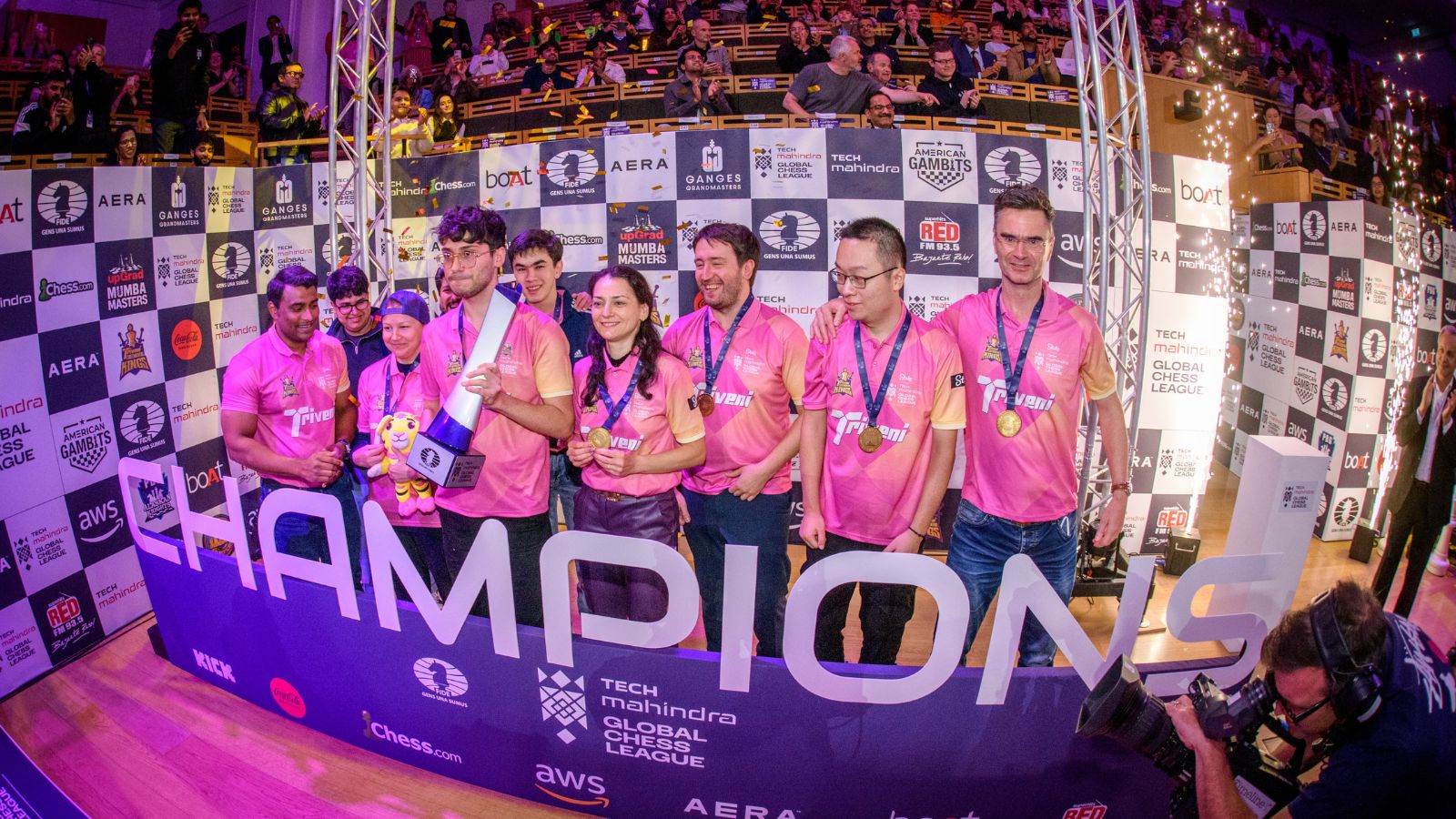Alireza Firouzja, the 21-year-old icon player of the Triveni Continental Kings, walked up to the emcee with a wide grin on his face. The Kings had claimed their second title in the Global Chess League defeating the PBG Alaskan Knights in a two-match finale, but the French-Iranian star had lost his individual battle against Anish Giri in the second match after winning the first clash on Saturday.
“I’m very thankful to my teammates. They make my mistakes not seem bad,” he said sheepishly as the rest of his team burst out laughing.
When the golden confetti had ceased falling and the pyrotechnics had stopped, Firouzja was not the only player who was relieved. Just moments earlier, Azerbaijani grandmaster Teimour Radjabov had also walked into the team huddle in the players’ lounge with relief writ large on his face.
“Sorry captain. But I had to lose (for the team to win),” Radjabov told Kings captain Loek van Wely before explaining to the rest of his team: “He told me that if you have a good position on the board, the team plays bad.”
That evoked more chuckles. Even though both their top male stars had lost, the Kings managed to claim the title, thanks to former world champion Alexandra Kosteniuk, who took down Tan Zhongyi in both games in the final, which was held across two matches with the two teams taking turns to play with white and black pieces.
Pulling rabbits out of the hat is now becoming something of a pattern for the Triveni Continental Kings. For the second straight season, the team has claimed the Global Chess League title.
Most of the six teams in the GCL have stuck to a template on how to build a team: an Indian grandmaster as the captain and at least one Indian superstar in the six-player roster.
But the Triveni Continental Kings have had a unique take on roster-building which has clearly worked wonders for them. The team are the only side to have a non-Indian captain in the form of Dutch grandmaster and national chess coach for the Italian team Loek van Wely, who was also part of the side in the first season. And their team is one of the only two teams — the other being the American Gambits — to not have an Indian player in the side.
“We went on a very strong journey early on to figure out who would be our coach because in my opinion the role of the coach is integral because you’re dealing with the top players in a sport. You need to have someone that not only will they respect and respond to but who will also understand what’s happening on the board and who will not be fooled by random things. We needed someone to have that kind of gravitas. We looked at multiple options and Luke and I got on a call with van Wely,” Akash Premsen, the CEO of Triveni Sports, told The Indian Express.
Premsen says that what really clicked between van Wely and him was that “both had a sense of humour”.
“We spent a lot of our time laughing but we hit it off because it became very clear that his style of working would go very well with the Triveni way of doing things and that he was also incredibly detail-oriented and also similar to me, highly competitive in terms of wanting to win,” Premsen added.
He points out that they have spent plenty of time working on their team culture, even if it’s a short league.
“What we’re trying to drive as a culture in the team is having a slightly low-stress environment. When my team’s in a good mood, everybody’s laughing, everybody’s smiling, everybody’s having a good time. It’s not actually non-serious, it’s actually incredibly good because that’s the vibe being set in terms of being calm,” Premsen said.
Another unique detail about the franchise is that it had links with the sport much before they bought a franchise in GCL. Dhruv Sawhney, who’s the CMD for Triveni Group, was the All India Chess Federation president from 1988 till the year 2000. He was the chief of the Indian chess federation when Viswanathan Anand became a grandmaster.
In the first season, their turnaround was even more remarkable. The Triveni Continental Kings were last in the standings at one stage, but managed to overturn the league’s apple cart. Pre-tournament favourites like the Ganges Grandmasters and the Alpine team could not even qualify for the final.
“It was a kind of like a movie in many ways, dead last halfway through GCL 1 and people making fun of us, saying things to me like, ‘oh it’s an Indian league and you don’t have an Indian player, you don’t have an Indian coach, you’re trying to be cool’. When you’re totally written off, that’s when our team really engaged and we kind of really pushed forth,” Premsen added.
What has also been remarkable for the Kings was that in both seasons they have had to find a replacement for their icon player at the last minute after their preferred pick from the draft backed out at the last minute. In the first season they brought in Levon Aronian to replace Ding Liren, who backed out to prepare for the World Championship. This season, they picked Ian Nepomniachtchi as their icon player, but after he ran into visa issues the team brought in Firouzja.
“In an incredibly short amount of time, how do you get people to genuinely care for the team? So last year, the reason we won the GCL 1 title is that we had a spirit that really transcended the situation,” Premsen added.



